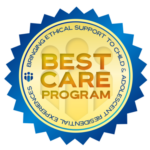Beyond the typical moodiness and angst that characterize adolescence, many teens are vulnerable to developing disorders like depression and anxiety. Due to factors like isolation, social media use, stress and bullying, adolescent mental health has rapidly become one of the foremost challenges in American culture. As we observe World Teen Mental Wellness Day on March 2, here are some steps you can take to help your teen lead a happier, more fulfilling life.
1. Demonstrate Healthy Coping Skills
Emotional resilience is foundational for teen mental wellness. By teaching your son how to handle complex emotions from a young age, he can learn to overcome life’s challenges and put negativity into perspective. Teens who lack an outlet for sadness, stress and other complex feelings may turn to alcohol or drugs to find relief.
Healthy coping mechanisms you can practice as a family include:
- Meditation, yoga and controlled breathing exercises
- Creative outlets such as journaling or drawing
- Spending time in nature
- Getting enough restful sleep every night
- Making time for hobbies and volunteer work
- Exercising and eating a balanced diet
2. Destigmatize Mental Health Issues
As a parent, you should be aware of teen mental health symptoms and how they differ from the typical ups and downs of adolescence. You should also strive to help your son understand that mental health challenges happen to many people, and are not cause for shame or secrecy. Normalize talking about your feelings, and emphasize that your child can always come to you when he needs help. Resist the urge to judge, argue or interrupt. Instead, be empathetic and compassionate.
3. Work With a Therapist
Sometimes, good coping skills and family support are not enough to overcome a mental health challenge. In these cases, a family therapist who specializes in working with adolescents can help your teen understand and take charge of his mental well-being.
In therapy, you and your teen can work on specific exercises to improve your family’s communications skills and identify specific problems within your relationship dynamics. An experienced counselor can also explain your teenager’s unique risk factors for developing various mental illnesses, and pinpoint changes you and other adults can make to improve teen mental health, including avoiding harmful habits like enabling.
By promoting mental wellness within your family, you can provide your son with the building blocks for a positive and fulfilling life.
Improving Teen Mental Wellness for 35 Years
Many mental health struggles emerge at an early age. The National Alliance on Mental Illness estimates half of all lifetime mental illness begins by age 14. Undiagnosed, untreated mental health issues rarely resolve without help. Instead, they can become larger problems that follow a troubled teen into adulthood.
If your son’s mental health and substance use is harming your family, ARCH Academy can help you. Our mission is to help young men and their families heal and move forward together through a carefully designed program that combines a 12-step curriculum, family involvement, academics and adventure to inspire lifelong recovery. Contact us today to learn more about what we offer.




